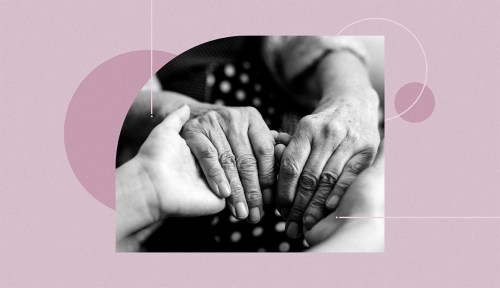“So, are you in remission now?” I’ve been asked this question a lot lately. Last year, I was diagnosed with and underwent treatment for stage II breast cancer. I did the obligatory Instagram posts—a video of myself ringing the bell after I completed five months of chemotherapy and another post after I finished 36 rounds of radiation. As a result, everyone wants to know if this means I’m officially cancer-free.
Remission is defined as “a decrease in or disappearance of signs and symptoms of cancer,” according to the National Cancer Institute. With breast cancer, most doctors usually don’t start using the word “remission” until you’ve gone five years without a recurrence. But I know that when my friends ask if I’m in remission, what they really want to know is if we can all move on.
“They want it to be over just as bad as the patient does,” Beret Loncar, LMT, a medical massage therapist who specializes in post-mastectomy massage, says of well-meaning friends and family members. “But the patient has to carry it with them.”
Many people who assume I’m in breast cancer remission have told me that I must be so glad “it’s behind” me now, but it doesn’t feel that way. As far as I can tell, cancer is not behind me; it’s front and center as I wonder if a moment of reckless abandon or simple pleasure will inexplicably bring my cancer back. I’m still exhausted from the toll of treatment, and my range of motion is limited. Even when cancer is no longer ravaging the body, its memory rattles around in your mind.
“Being done with treatment is psychologically one of the most difficult, if not the most difficult, stage for patients,” says Carrie Kozel, DPT, a physical therapist at Turning Point Breast Cancer Rehabilitation Center. Patients often feel the greatest disconnect from family and friends after completing active treatment because their loved ones are eager to move on and get life back to normal. “Cancer survivors really have a difficult time doing that because they aren’t the same person anymore,” Kozel says.
Many patients feel insecure and even disconnected from their bodies. They may suffer chronic anxiety as they fear a recurrence. This is on top of the physical struggles they may face, such as fatigue, neuropathy, and a decrease in upper body strength and range of motion. “All too often, patients are left with little or no support after they have been given a clean bill of health,” Loncar says. “It is important to remember that we are treating people and that their entire wellness is important.”
In addition to the emotional impact of enduring treatment, Kanesha Broadwater, CNRN, an oncology nurse at Northwestern Memorial Hospital in Chicago, says some patients also experience separation anxiety when it’s over. “In my current role, patients often come daily for their radiation treatments, and our team is always available for all questions and concerns, big or small,” she says. “When patients complete treatment, some struggle with the thought of not having that access to their team.”
Broadwater knows firsthand how challenging life after cancer can be. She was diagnosed with breast cancer in 2017. Returning to work and day-to-day life after treatment was tough because she had little energy. But, she says, this experience made her a better nurse. “I’d like to believe I have always been empathetic,” she says, “but now I have a clear understanding of how diagnosis and treatment can really affect everything.”
To help cope with cancer’s mental and emotional aftermath, cancer survivors need to know they’re allowed to speak up about what ending treatment and entering breast cancer remission actually means to them. After treatment, amidst the collective relief that those around them express, you’re allowed to have bad days among the good. So if you’re having issues, tell your care team how you’re feeling—and tell your loved ones what you need from them, too.
Additionally, you can seek out counseling and support groups through your local cancer center or find resources and support groups online. Beret uses yoga and meditation to help her patients calm their anxiety and learn to reconnect with their bodies. Gentle exercise—like stretching, a brisk walk, or light weights—can boost energy levels and confidence, improve range of motion, says Carol Michaels, ACSM, founder of Cancer Recovery Fitness and author of Exercises for Cancer Survivors. No matter what you decide, know that you’re allowed to move through this process at your own pace.
Some patients think they should shrug off the lingering effects of treatment and simply be grateful to be alive. “While that’s a nice mindset, it also limits you from being even better and being able to really thrive,” Kozel says. It’s okay for a contradictory mix of emotions to swirl around inside you, but rest assured, life after cancer isn’t all gloom and doom. When I finished active treatment, I slowly found reasons to celebrate each day. Cookies no longer tasted like sand. My stomach wasn’t constantly queasy. I had eyebrows again; bit by bit, I discovered that I was shifting from surviving to thriving.
Oh hi! You look like someone who loves free workouts, discounts for cutting-edge wellness brands, and exclusive Well+Good content. Sign up for Well+, our online community of wellness insiders, and unlock your rewards instantly.
Sign Up for Our Daily Newsletter
Get all the latest in wellness, trends, food, fitness, beauty, and more delivered right to your inbox.
Got it, you've been added to our email list.











